March 2015 |
|
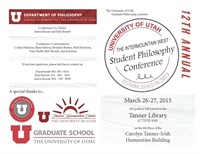 | Thursday, March 26 | 12:30pm – Saturday, March 28 | 6pm 12th Annual Intermountain West Graduate Student Philosophy Conference (IMWGSPC)
March 26-28, 2015
Salt Lake City, Utah Keynote Speaker:
Branden Fitelson
(Rutgers University) Everyone is welcome to attend Agenda - All conference presentations will be held in the Tanner Library, Room 459 and the Philosophy Lounge, Room 401, both rooms are located inside the Tanner Humanities Building - (CTIHB) on the campus map. |
|
|
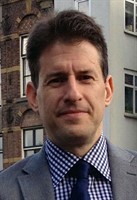 | Friday, March 27 | 4 – 5pm Keynote Speaker of the Intermountain West Graduate Student Philosophy Conference. Title: “Epistemic Utility Theory” Abstract In this talk I will explain the basics of epistemic utility theory and how it can be used to ground coherence requirements for various sorts of judgments (e.g., both degree of belief and full belief). The main idea is that, while belief (and degree of belief) aims at truth (i.e., minimizing inaccuracy), epistemic rationality only requires that one's judgments minimize expected inaccuracy. This fact about the nature of epistemic rationality allows us to resolve various problems and puzzles in contemporary epistemology (e.g., lottery paradoxes, preface paradoxes, etc.). |
|
April 2015 |
|
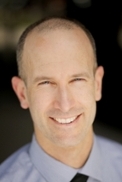 | Friday, April 10 | 2:30 – 4:30pm Title: Liberalism, autonomy, and the agent-constitution of the good Abstract: The view that we have a moral obligation to allow other persons to choose how to lead their own lives, provided that they exhibit certain rational capacities, is widely accepted. Let’s call this view moral liberalism (to distinguish it from the political sort). One putative justification for moral liberalism is pluralism about the good: if there are many different versions of the good life—a fact that may be evinced by intractable disagreements about it—then each of us should be free to choose for herself how to live. One strong but widely-accepted version of pluralism is agent-constitution: on this view, the good is plural because agents, if they exhibit the rational capacities that mark them as autonomous, constitute their own good by choosing it.
Despite its appeal, I will argue that even a plausibly qualified version of agent-constitution must be false: agents, irrespective of their psychological characteristics, can be mistaken about the relative merits of their aims and goals. It is, first, clear that agents do not have authority regarding the relative merits of their aims when interpersonal moral requirements impinge on them. We can imagine scenarios where an agent may harm others to advance one of his aims, but may not cause the same harms to advance another—implying the former is more important than the latter from the interpersonal standpoint. Of course, moral liberalism is typically supported by a distinction between private and public, or between self-regarding and other-regarding decisions: agents may do what they like when their decisions are private or self-regarding, but not when they are public or other-regarding. Self-regarding decisions appear to be a realm where interpersonal morality does not apply. So, presumably, the self-regarding/other-regarding distinction salvages agent-constitution: agents may not have authority regarding the interpersonal merits of their aims, but do have that authority when their decisions are self-regarding.
I further argue, however, that the only plausible distinction between self- and other-regardingness depends upon an assessment of the relative merits of an agent’s aims versus others’ aims. In fact, I claim, a decision is self-regarding only if it is one in which the relative merits of the agent’s competing aims are, on the whole, greater than the relative merits of others’ competing aims. But in that case, self-regarding decisions are no refuge for agent-constitution: agents merely appear to have authority over the relative merits of their aims in self-regarding decisions because others’ aims do not override them in a way that triggers interpersonal moral requirements.
If this is correct, there is likely no way to rescue agent-constitution, although I will consider some attempts to do so. I will also examine, briefly, what the fall of agent-constitution means for moral liberalism: even if (as seems likely) more moderate forms of pluralism still hold, additional justifications for liberalism’s anti-paternalist stance will be needed. |
|
September 2015 |
|
 | Friday, September 4 | 2:30 – 4:30pm This presentation is on joint work with Justin Bruner Abstract Power and Diversity in Epistemic Communities There are (at least) two reasons why philosophers might care about the diversity of epistemic communities. The first concerns social justice. Women, people of color, and other underrepresented groups deserve access to the same opportunities for academic work as their peers. The second reason concerns the success of epistemic communities. It has been widely argued that diversity improves inquiry. If so, those who care about successful inquiry should care about the make-up of epistemic communities. As we argue in this paper, even in the absence of explicit bias, implicit bias, and stereotype threat, minority groups can end up disadvantaged in epistemic communities due to the dynamics of social interaction. In particular, we will use evolutionary game theoretic models to show that when majority and minority groups interact, minority types often learn to accommodate majority types, while the majority learns to take advantage of this accommodating behavior. As a result, minority groups end up disadvantaged in strategic scenarios. One of the most striking things about the effects we describe is that minority disadvantage occurs even in models of populations that can be thought of as well meaning - where actors are not biased and do not actively try to disadvantage minority groups. This is not to say that their eventual behavior is unobjectionable, but rather that behavior consistent with bias and discrimination arises as a result of reasonable learning by reasonable agents |
|
|
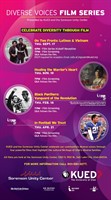 | Thursday, September 17 | 6pm KUED and the Sorenson Unity Center celebrate our community's diverse voices through four powerful films that highlight the cultural heritage of Utah's diverse families. Join us for the Kickoff Reception on September 17. RSVP required. Email Julia at jnguyen@kued.org. All films are free and are held at the Sorenson Unity Center, 1383 S. 900 W., Salt Lake City For more information, call 801-581-3277 | Event Categories: | Community Engagement, Films, Lectures, Seminars |
|---|
| Alternate Location: | Sorenson Unity Center |
|---|
| Cost: | RSVP Required for Reception; Film Screening is Free |
|---|
| Contact Name: | Julia Nguyen |
|---|
| Contact Phone: | 801-581-3277 |
|---|
| Contact Email: | jnguyen@kued.org |
|---|
| Campus Wide Event: | Yes |
|---|
|
|
|
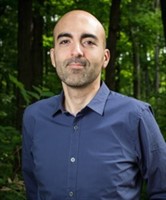 | Friday, September 18 | 2 – 4pm The Challenges of Choosing and Explaining Phenomena in “Hispanic Paradox” Epidemiology For over three decades, epidemiologist have been actively debating how to explain the “Hispanic Paradox,” data indicating that US Hispanics are (or at least appear to be) far healthier than would be expected given their relatively low average socioeconomic status. Using the “phenomenon choice" framework I developed in a 2010 paper, I argue that a key obstacle to explaining the Hispanic Paradox is that Hispanic Paradox researchers have been partly talking past one another, due to a (largely unspoken) disagreement about exactly what phenomenon needs to be explained. I also illustrate that such research is further impeded by the peculiar historical and demographic meaning of “Hispanic.” I conclude with a discussion of some of the ethical and policy issues raised by these technical challenges in epidemiological research design and practice, and I provide suggestions for how to proceed in light of those issues. |
|
October 2015 |
|
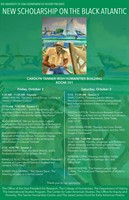 | Friday, October 2 – Saturday, October 3 The University of Utah Department of History Presents: New Scholarship on the Black Atlantic Friday, October 2, 9 AM - 4 PM
Saturday, October 3, 9 AM - 1 PM CTIHB 351 |
|
|
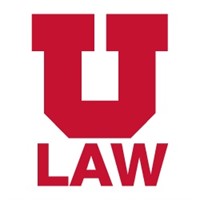 | Friday, October 2 | 8am – 4pm This Symposium celebrates the opening of the “Kristen Ries and C. Maggie Snyder HIV/AIDS Archive” at the University of Utah Marriott Library. A major purpose of this event is to honor these two medical pioneers, who led the fight against the disease in Utah. Three renowned scholars from different disciplines – medicine, social history, and law – will present the principal papers that consider the historical arc of the disease from the unique perspective of their disciplines. Panels of experts in each field will then comment on the presentations. Between presentations, Utahns involved in the fight against HIV/AIDS will present tributes to Dr. Ries and Ms. Snyder. This event will be streamed online on the S.J. Quinney College of Law Youtube channel. This Symposium is proceeded by the dedication of a history archive at the University of Utah Marriott Library on Sept 30. | Campus Locations: | Quinney College of Law - S. J. (LAW) |
|---|
| Room Name/Number: | S.J. Quinney Moot Courtroom (6200) |
|---|
| Cost: | Free |
|---|
| Transportation / Parking: | Free parking is available at Rice-Eccles Stadium. Take the Trax stop to Stadium. |
|---|
| Contact Name: | Erin |
|---|
| Contact Phone: | 801-585-3440 |
|---|
| Contact Email: | stegner@law.utah.edu |
|---|
| Campus Wide Event: | Yes |
|---|
|
|
|
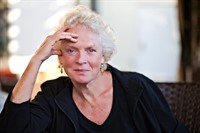 | Monday, October 5 | 12 – 2pm Margaret Pabst Battin, M.F.A., PhD., is Distinguished Professor of Philosophy and Medical Ethics at the University of Utah. She has authored, co-authored, edited, or co-edited some twenty books, including Drugs and Justice and The Patient as Victim and Vector: Ethics and Infectious Disease. She has published two collections of essays on end-of-life issues, The Least Worst Death and Ending Life; a comprehensive digital archive and print volume, "The Ethics of Suicide: Historical Sources," is being presented at this event. Her new projects include a book on large-scale reproductive problems of the globe and work on challenging assumptions in urban design. | Event Categories: | Exhibitions, Lectures, Seminars, Workshops & Training |
|---|
| Campus Locations: | Marriott Library - J. Willard (M LIB) |
|---|
| Room Name/Number: | Gould Auditorium |
|---|
| Cost: | Free to the Public |
|---|
| Transportation / Parking: | Park in the visitor parking lot, west of the library, next to the bookstore.
www.lib.utah.edu… |
|---|
| Contact Name: | Heidi Brett |
|---|
| Contact Phone: | 801-585-7758 |
|---|
| Contact Email: | heidi.brett@utah.edu |
|---|
| Campus Wide Event: | Yes |
|---|
|
|
|
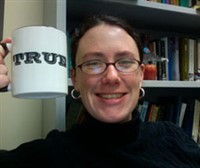 | Friday, October 23 | 2:30 – 4:30pm Time Bias and Non-Hedonic Value An important part of the value we place in many activities depends on our beliefs about how these activities relate to those of other people, including those who existed before our birth and those who have yet to be born. Some philosophers---most recently Samuel Scheffler---have claimed that this sort of valuing is significantly time biased: what matters to us crucially depends on our relation to people who will live in the near future, and less so---or even not at all---on our relation to people of the distant future or the past. In this talk, I'll present thought experiments aimed to show that this thesis is false: the temporal location of another person, by itself, does not systematically affect our valuing. The first part of the talk develops and defends a temporally neutral account of such valuing. I then apply the theory to a longstanding puzzle of meaning nihilism pressed by Leo Tolstoy and others: Given that one day humanity will end and all will be forgotten, aren’t our lives meaningless? I'll argue that this puzzle is generated by an inconsistent application of time-neutral and time-biased theories of non-hedonic value. Once the inconsistency is removed, the problem disappears. |
|
|
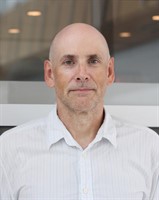 | Friday, October 30 | 2:30 – 4:30pm Title: In Defense of the Actualism/Possibilism Distinction Actualism is the thesis that, necessarily, whatever is, in the broadest sense, exists, or is actual. Actualism is typically contrasted with possibilism, the thesis that being comes in two “flavors”: actuality — the particularly robust type of being enjoyed by concrete things like you and me as well as necessarily existing things like numbers and pure sets — and mere possibility, the rather more wan type of being exhibited by such things as the Pope’s possible children, i.e., things that are not actual but could have been. Actualism can then alternatively be defined as the view that there neither are nor could have been any merely possible things. In his recent book Modal Logic as Metaphysics, Timothy Williamson has argued that the actualism/possibilism distinction is “badly confused” and, indeed, “hopelessly muddled”, and that the issues at stake in modal metaphysics that had been expressed in terms of the distinction are far more clearly and, hence, more usefully expressed in terms of a distinction between what he calls necessitism and contingentism. In this talk, after sketching the historical origins of the actualism/possibilism distinction, I will argue (a) that the distinction is in fact entirely clear and (b) that, given the machinery Williamson needs to defend his preferred necessitism/contingentism distinction, the two distinctions are interdefinable and, hence, that neither is clearer or more rigorous than the other. I will close by suggesting some reasons why the actualism/possibilism distinction might indeed be preferred to Williamson’s distinction. |
|
November 2015 |
|
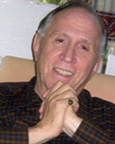 | Friday, November 13 | 2:30 – 4:30pm Title: "The Philosophy of History" I will outline and follow certain trends in the development of historical understanding, glancing briefly at the paradigms of the pre-Socratics and Plato, of Thucydides and Augustine, of the Enlightenment's mathematical science versus Vico, of Hegel and Marx, then putting special focus on the modern distinctions between clock time and lived time, and the import of those revolutionary concepts. |
|
January 2016 |
|
Thursday, January 21 | 12 – 1pm J. Patrick Dobel, from the Evans School of Public Policy and Governance at the University of Washington, is a well-known ethics scholar in the field of public administration and public management. He has consulted with many universities and government agencies on issues related to ethics and accountability. He is going to speak on the challenges involved with government corruption and exercising public office with integrity. Prof. Dobel's talk is the 2016 Dalmas Nelson Lecture on Law and Ethics, co-sponsored by the Hinckley Institute's Pizza & Politics lunch series. Pizza will be served for attendees! We welcome anyone interested to join us on Thursday at noon. |
|
February 2016 |
|
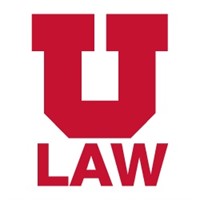 | Friday, February 19 | 8pm – Saturday, February 20 | 4am The Social Justice Student Initiative invites you to the 2nd Annual Human Trafficking Symposium sponsored by the Global Law Program and the College of Social Work. The event will focus on bringing to light the harsh reality of at-risk, runaway, and homeless youth who are recruited, forced, and coerced into sex trafficking. The Keynote Speaker is from Shared Hope International, an organization that coordinates efforts to improve the response to victims of trafficking in the U.S. and abroad. The workshops will include legislative advocacy, trafficking and the juvenile justice system, on-line exploitation, medical and socio-legal concerns, and much more. |
|
March 2016 |
|
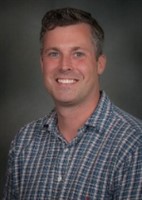 | Thursday, March 10 | 6 – 8pm You’ve heard of “i-limbs” and artificial organs, but do you know how advanced technology for prosthetic limbs has become? Learn how tech that used to be in the realm of Sci-fi is rapidly becoming reality. Join our panelists and a moderator Jennifer Napier-Pearce as they discuss the science of bio-engineering and how bionic limbs are starting to replace standard prosthetics with the help of modern technology. James Tabery – Associate Professor of Philosophy and Adjunct Associate Professor of Pediatrics and Internal Medicine at the University of Utah. Jim Tabery’ s research focuses largely on the philosophy of science and applied ethics, as well as the intersection between those domains. On the philosophy of science side, he investigates questions of causation and explanation in biology; while on the applied ethics side, he explores how the answers to those questions have ethical, legal, and social implications. Read the review of his book “Beyond Versus” | Event Categories: | Lectures |
|---|
| Alternate Location: | The Leonardo Museum |
|---|
| Cost: | no cost |
|---|
| Transportation / Parking: | 209 East 500 South
Salt Lake City, Utah 84111
ph. 801.531.9800
www.theleonardo.org… |
|---|
| Contact Name: | Connie Corbett |
|---|
| Contact Phone: | 801-581-8162 |
|---|
| Contact Email: | c.corbett@utah.edu |
|---|
| Campus Wide Event: | Yes |
|---|
|
|
|
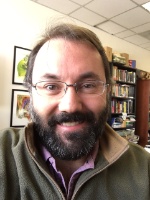 | Friday, March 11 | 2:30 – 4:30pm "Unlikely Partners? Videogames and Moral Reflection" Abstract:
Videogames are the dominant art form of the 21st century. What we choose to say and express with them, and how we engage with and play them, reflects and informs our behavior and broader understanding of morality and ethics. This talk will provide an overview of how videogames can serve as a platform for ethical reasoning. More specifically we will examine the role that interface design can have in encouraging players to have ethical experiences. Bio:
Dr. José P. Zagal is currently visiting faculty at the University of Utah’s nationally ranked Entertainment Arts & Engineering program where he teaches a variety of courses on game design and analysis. His research work explores the development of frameworks for describing, analyzing, and understanding games from a critical perspective to help inform the design of better games. He is also interested in supporting games literacy through the use of collaborative learning environments. His book on this topic, “Ludoliteracy: Defining, Understanding, and Supporting Games Education” was published in 2010. In 2012 he edited “The Videogame Ethics Reader”, a collection of writings that provide an entry point for thinking, deliberating, and discussing ethical topics surrounding videogames. His next book, in collaboration with Dr. Sebastian Deterding, provides an in-depth examination of role-playing games across different media and disciplinary contexts. It will be published in 2017 by Routledge. Jose received his PhD in computer science from Georgia Institute of Technology in 2008, his M.Sc. in engineering sciences and a B.S. in industrial engineering from Pontificia Universidad Catolica de Chile in 1999 and 1997.l Reflection" |
|
|
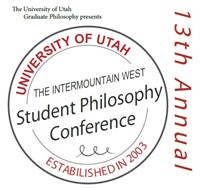 | Thursday, March 24 | 10am – Friday, March 25 | 1pm The IWGSPC will be March 24 - 25, 2016 in the Philosophy Department located in the Tanner Humanities Building, Room 459. Please join us. |
|
|
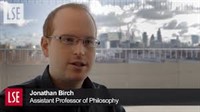 | Monday, March 28 | 2:30 – 4:30pm "Kin Selection, Group Selection and the Deep Structure of Human Cooperation" The relationship between kin and group selection is a contested issue in evolutionary theory, and matters are not helped by a tendency to conflate questions of methodology with questions of causality. Drawing inspiration from W. D. Hamilton, I suggest we think about the distinction between kin and group selection in terms of differences of degree in the structural features of populations. I further argue that we can usefully draw a parallel distinction in the case of cultural evolution. Cultural group selection, which involves competition between stable, well-defined “tribes", has received a great deal of attention in recent years. Cultural kin selection, which relies on kinship relations in more loosely structured social networks, has been largely neglected. I argue that cultural kin selection deserves more attention than it has so far received. In particular, it may help explain how the “tribal” social structure presupposed by models of cultural group selection originally came to exist. |
|
April 2016 |
|
 | Monday, April 4 | 9am – 5pm Come to the Marriott Library for the Spring Book Sale. Always great books at great prices! |
|
|
 | Wednesday, April 6 | 9am – 5pm Come to the Marriott Library for the Spring Book Sale. Always great books at great prices! |
|